
The Byrds were an American rock band formed in Los Angeles, California, in 1964. The band underwent multiple lineup changes throughout its existence, with frontman Roger McGuinn remaining the sole consistent member. Although their time as one of the most popular groups in the world only lasted for a short period in the mid-1960s, the Byrds are considered by critics to be among the most influential rock acts of their era. Their signature blend of clear harmony singing and McGuinn's jangly 12-string Rickenbacker guitar was "absorbed into the vocabulary of rock" and has continued to be influential.
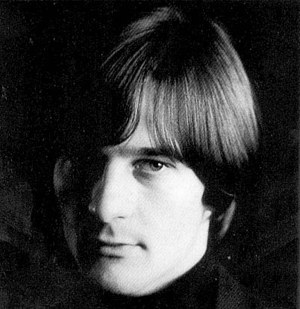
Harold Eugene Clark was an American singer-songwriter and founding member of the folk rock band the Byrds. He was the Byrds' principal songwriter between 1964 and early 1966, writing most of the band's best-known originals from this period, including "I'll Feel a Whole Lot Better", "She Don't Care About Time", "Eight Miles High" and "Set You Free This Time". Although he did not achieve commercial success as a solo artist, Clark was in the vanguard of popular music during much of his career, prefiguring developments in such disparate subgenres as psychedelic rock, baroque pop, newgrass, country rock, and alternative country. He was inducted into the Rock and Roll Hall of Fame in 1991 as a member of the Byrds.
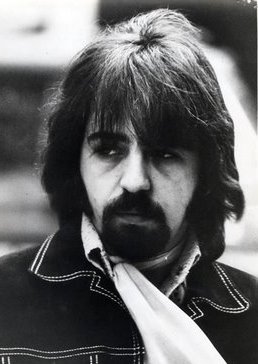
Clarence White was an American bluegrass and country guitarist and singer. He is best known as a member of the bluegrass ensemble the Kentucky Colonels and the rock band the Byrds, as well as for being a pioneer of the musical genre of country rock during the late 1960s. White also worked extensively as a session musician, appearing on recordings by the Everly Brothers, Joe Cocker, Ricky Nelson, Pat Boone, the Monkees, Randy Newman, Gene Clark, Linda Ronstadt, Arlo Guthrie, and Jackson Browne among others.

Michael Clarke was an American musician, best known as the drummer for the 1960s rock group the Byrds from 1964 to 1967. He died in 1993, at age 47, from liver failure, a direct result of more than three decades of heavy alcohol consumption.
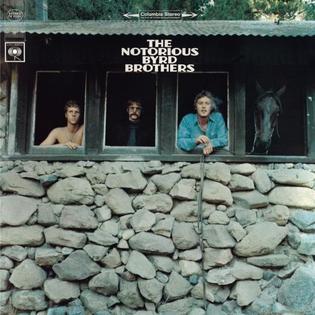
The Notorious Byrd Brothers is the fifth album by the American rock band the Byrds, and was released in January 1968, on Columbia Records. The album represents the pinnacle of the Byrds' late-'60s musical experimentation, with the band blending together elements of psychedelia, folk rock, country, electronic music, baroque pop, and jazz. With producer Gary Usher, they made extensive use of a number of studio effects and production techniques, including phasing, flanging, and spatial panning. The Byrds also introduced the sound of the pedal steel guitar and the Moog modular synthesizer into their music, making it one of the first LP releases on which the Moog appears.

Turn! Turn! Turn! is the second studio album by the American rock band the Byrds, released on December 6, 1965, by Columbia Records. Like its predecessor, Mr. Tambourine Man, the album epitomized the folk rock genre and continued the band's successful mix of vocal harmony and jangly twelve-string Rickenbacker guitar. The album's lead single and title track, "Turn! Turn! Turn!", which was adapted by Pete Seeger from text in the Book of Ecclesiastes, had previously been arranged in a chamber-folk style by the Byrd's lead guitarist Jim McGuinn for folk singer Judy Collins' third album, but the arrangement he used for the Byrds' recording of the song utilizes the same folk-rock style as the band's previous hit singles.

Fifth Dimension is the third album by the American rock band the Byrds and was released in July 1966 on Columbia Records. Most of the album was recorded following the February 1966 departure of the band's principal songwriter Gene Clark. In an attempt to compensate for Clark's absence, guitarists Jim McGuinn and David Crosby increased their songwriting output. In spite of this, the loss of Clark resulted in an album with four cover versions and an instrumental, which critics have described as "wildly uneven" and "awkward and scattered". However, it was the first Byrds album not to include any songs written by Bob Dylan, whose material had previously been a mainstay of the band's repertoire.
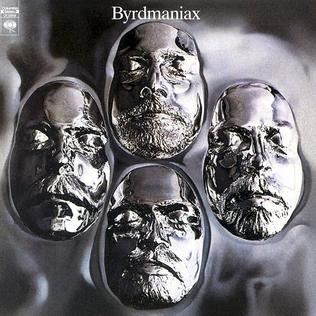
Byrdmaniax is the tenth album by the American rock band the Byrds. It was released in June 1971 on Columbia Records at a time of renewed commercial and critical success for the band, due to the positive reception that their two previous albums, Ballad of Easy Rider and (Untitled), had received. The album was the second by the Byrds to feature the Roger McGuinn, Clarence White, Gene Parsons, and Skip Battin line-up of the band and was mostly recorded in early 1971, while the band were in the midst of an exhausting tour schedule. As a result, the band had little time to hone their new songs before recording commenced and thus, much of the material on the album is underdeveloped. Byrdmaniax was poorly received upon release, particularly in the United States, and did much to undermine the Byrds' new-found popularity.

Farther Along is the eleventh album by the American rock band the Byrds and was released in November 1971 on Columbia Records. For the most part, the album was recorded and produced by the Byrds themselves in London, England, over the course of five work-intensive days in July 1971. It was quickly released as a reaction to the commercial failure of the Byrds' previous album, Byrdmaniax, and as an attempt to stem the criticism that album was receiving in the music press.

Byrds is the twelfth and final studio album by the American rock band the Byrds and was released in March 1973 on Asylum Records. It was recorded as the centerpiece of a reunion among the five original band members: Roger McGuinn, Gene Clark, David Crosby, Chris Hillman, and Michael Clarke. The last time that all five members had worked together as the Byrds was in 1966, prior to Clark's departure from the band. During the reunion, the current, latter-day lineup of the band continued to make live appearances until February 1973, with McGuinn being the only member common to both versions of the group.
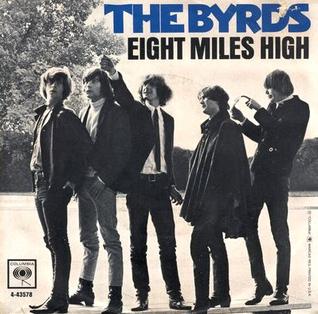
"Eight Miles High" is a song by the American rock band the Byrds, written by Gene Clark, Jim McGuinn, and David Crosby. It was first released as a single on March 14, 1966. Musically influenced by sitar player Ravi Shankar and jazz saxophonist John Coltrane, the song was influential in developing the musical styles of psychedelia and raga rock. Accordingly, critics often cite "Eight Miles High" as being the first bona fide psychedelic rock song, as well as a classic of the counterculture era.
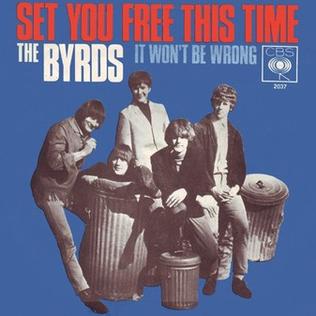
"Set You Free This Time" is a song by the American folk rock group the Byrds, written by band member Gene Clark. It was first released in December 1965 on the group's Turn! Turn! Turn! album, and later issued as a single in January 1966.
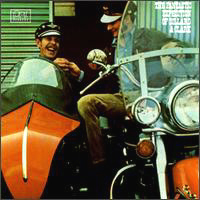
The Fantastic Expedition of Dillard & Clark is a country rock album by Dillard & Clark. A&M Records issued the album in the US in October 1968, and its release in the UK followed in July 1969. The album was recorded in 1968, shortly after Gene Clark had departed the Byrds for the second time and after Doug Dillard left the Dillards. The album is hailed by critics and musicians as a unique masterpiece at the intersection of country rock and Americana.

Preflyte is a compilation album by the American folk rock band the Byrds and was released in July 1969 on Together Records. The album is a collection of demos recorded by the Byrds at World Pacific Studios in Los Angeles during late 1964, before the band had signed to Columbia Records and become famous. It includes early demo versions of the songs "Here Without You", "You Won't Have to Cry", "I Knew I'd Want You", and "Mr. Tambourine Man", all of which appeared in re-recorded form on the band's 1965 debut album.

Never Before is a compilation album by the American rock band the Byrds, consisting of previously unreleased outtakes, alternate versions, and rarities. It was initially released by Re-Flyte Records in December 1987 and was subsequently reissued on CD in 1989, with an additional seven bonus tracks.

McGuinn, Clark & Hillman were an American rock group consisting of Roger McGuinn, Gene Clark, and Chris Hillman, who were all former members of the band the Byrds. The group formed in 1977 and was partly modeled after Crosby, Stills, Nash & Young and, to a lesser extent, the Eagles. They were reasonably successful commercially in the United States, with their debut album reaching number 39 on the Billboard Top LPs & Tapes chart and the single "Don't You Write Her Off" reaching number 33 on the Billboard Hot 100.

"She Don't Care About Time" is a song by American folk rock band the Byrds. It was released on a non-album single in October 1965, as the B-side to "Turn! Turn! Turn!". The song was written by Gene Clark, the Byrds' main songwriter between 1964 and early 1966. "She Don't Care About Time" was recorded during sessions for the group's second album Turn! Turn! Turn!. The song is on most of the band's hits compilations.
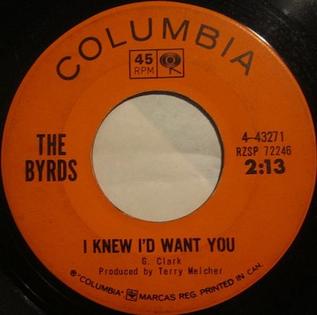
"I Knew I'd Want You" is a song by the folk rock band the Byrds, written by band member Gene Clark, and first released as the B-side to their 1965 debut single, "Mr. Tambourine Man". It was also later included on their debut album, Mr. Tambourine Man.
"Here Without You" is a song written by Gene Clark that was first performed on the Byrds' 1965 debut album Mr. Tambourine Man. It was later covered by other artists, including Reigning Sound and Richard Thompson.
"If You're Gone" is a song written by Gene Clark that was first released on the Byrds' 1965 album Turn! Turn! Turn!.


















